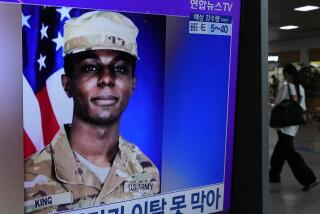Last Soldier to Leave Vietnam Is Feared Dead
- Share via
WASHINGTON — He was last in the line moving up the ramp into a waiting C-130 at Tan Son Nhut air base--a tall, husky man with an open Midwestern face who was about to step into history. It was March 29, 1973, in Saigon. And Master Sgt. Max Beilke was officially designated as the last American combat soldier to leave Vietnam.
He had survived two wars, Korea and Vietnam. Now he was going home to his family in Minnesota.
Twenty-eight years later, Beilke--at 69 long since retired from the Army but pursuing a second career helping veterans--was suddenly plunged into his third conflict: the war of terror.
Defense Department officials have added his name to the list of those believed killed when a hijacked airliner hit the Pentagon on Tuesday.
“How do you explain a brother to somebody?” his sister Lucille Johnson of Evansville, Minn., wondered aloud Saturday. “He was very tall, not heavy but good-sized, a good German boy. Very dedicated to his work.
“He was a very soft person, a very low-key person. He really enjoyed working with the retirees, making sure they got what they had coming and needed.
“We’ll all be there when it’s time,” Johnson said, speaking for the four of Beilke’s five surviving sisters. “We just hope they find his remains and put closure to this. That’s what we’re looking for now.”
Active in His Neighborhood
His neighbors in suburban Laurel, Md., remember Beilke as a quiet, friendly man who never talked about his military experience. The kind of man who loved his flower beds and flourishing crepe myrtles, who audited the books of the homeowners association for free, saving his working-class neighbors $1,000 or so a year. The kind who kept doing so even after the association turned down his request to put a flagpole by the driveway.
The houses on Falling Waters Court are just 12 years old, and neighbor Lee Minton recalled that Beilke wasn’t happy about the “stick” trees. They were not big enough for squirrels, and he liked squirrels. So he put out nuts and food on his deck and the squirrels came running.
In fact, they would swarm out from the park behind Minton’s house, cross the street and scamper up Beilke’s driveway to get their meals. The squirrels would make a “daily passage,” Minton said, laughing.
It was Minton’s wife, Nancy, who figured out something was wrong when she saw a car belonging to one of the Beilkes’ daughters parked outside the house Wednesday. “She usually comes at the holidays. And then I saw some people in military uniform and I really got scared,” Nancy Minton said Saturday, blinking back tears.
She called Beilke’s wife, Lisa, and learned that he was one of those missing at the Pentagon--and feared dead.
Lisa Beilke “was extremely upset and extremely hopeful,” Nancy Minton said. “She said to me: ‘Max has a lot more living to do. We’ve got a lot more work in the yard to do, and a lot more traveling.’ ”
Nancy Minton prepared a note and put a copy in every mailbox on Falling Waters Court: “Dear Neighbors, I want to share some sad news with our community. Max Beilke, who works at the Pentagon, is listed as missing. Please keep Lisa, Joseph and the Beilke family in your thoughts and prayers.”
Beilke grew up in Alexandria, Minn., amid the corn and soybean farms west of Minneapolis. His father drove a truck and worked for Land O’Lakes, the butter and cream company. The family lived on several acres outside of town--”a hobby farm,” they called it, not a big working farm like the ones that grew hundreds of acres of grain, fed beef cattle or produced milk.
He finished high school in 1950. He liked sports, but mostly “he liked being home on the farm with mom and dad,” his sister said.
In 1952, Beilke was drafted and later shipped out to Korea. He served his hitch and returned to civilian life. But something was missing. In 1956, he reenlisted, this time prepared to stay.
Beilke was approaching his 40th birthday and already a master sergeant with nearly 20 years’ service when he got to Vietnam in July, 1972. By then, the war was a savagely divisive conflict for Americans, and President Richard M. Nixon was edging out.
For eight months, Beilke served as operations sergeant at Saigon’s Camp Alpha, which processed all Army troops going in and out of the country. When the Paris peace accords were signed in 1973, the stage was set for his historic moment.
Among other things, the accords provided that all U.S. POWs would be released in Hanoi and all American troops would leave Vietnam by March 29, 1973--all but the Marine guards and military attaches at the U.S. Embassy, who were not counted as U.S. combat forces.
When the deadline arrived, Beilke said later: “I can remember a colonel coming through the door and saying, ‘Beilke, they’re off the ground. They’re in the air at Hanoi. Let’s go home.’ That’s when we stamped the last orders and closed her up.”
Last Soldier Up the Ramp
The fall of Saigon to the North Vietnamese, and the desperate evacuation of the U.S Embassy, did not occur until April 29, 1975. But the official completion of the American troop withdrawal in 1973 was a major event. Beilke’s family back home watched it on television.
For many who boarded the last plane, it was a bitter experience. As agreed to in Paris, observers from the North Vietnamese army looked on, sometimes smiling and trying to shake hands with American officers. The gestures were largely ignored, or rebuffed with curses.
When Beilke started up the ramp, a North Vietnamese colonel stepped forward and presented him with a gift--a straw place mat decorated with the picture of a pagoda. Beilke, according to accounts at the time, looked down at the colonel, accepted the gift and went on up the ramp.
“March 29 always sticks with me,” Beilke told an interviewer years later. “There are certain things--like your wedding anniversary, the day you came into the Army, the first time I left the country and shipped out for Korea in ‘53--you remember those dates.”
His sister Lucille noted that it was after he came home from Vietnam that Beilke developed a passion for fishing. “It was the peacefulness of it,” she said.
With 21 years’ service completed, Beilke retired from the Army on Nov. 1, 1974.
Once more, he worked at various jobs before finding a niche lobbying for active and retired military personnel.
In 1984, he returned to the Army as a civilian employee, focusing on the problems of Vietnam War veterans.
“I’ve always felt that we brought these young men out of Vietnam and discharged them from the Army and they lost their support group,” he said later. “When they went out into civilian life, and in some places a very hostile civilian life, it was tough for them to cope.”
“That’s what Max was there for. He traveled all across the country,” urging veterans to get help, his sister said.
There were unopened bags of mulch stacked at the top of Max Beilke’s driveway Saturday, but nobody was doing any yardwork.
“He was a very good neighbor and a very decent man,” Nancy Minton said. “I wish it all will have a happy ending, but I don’t think so.”
More to Read
Sign up for Essential California
The most important California stories and recommendations in your inbox every morning.
You may occasionally receive promotional content from the Los Angeles Times.













